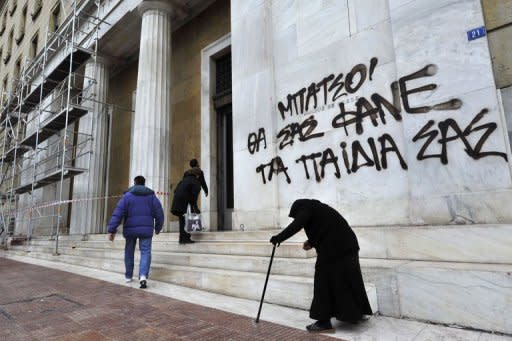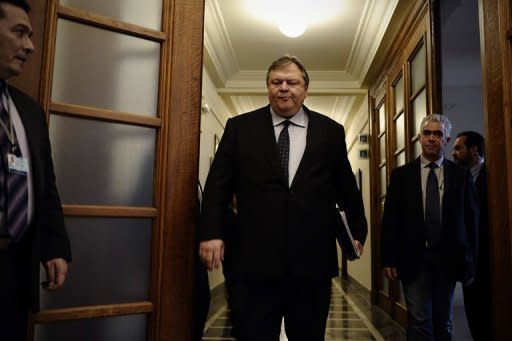Eurozone delays crucial Greek bailout decision
Eurozone finance ministers put a new Greek bailout on hold Tuesday after Athens failed to meet conditions set by lenders in return for a rescue package Athens desperately needs to avoid default. The eurozone had demanded that Greece's finance minister come to Brussels on Wednesday with an extra 325 million euros ($425 million) in budget cuts and written pledges from politicians to implement EU-ordered austerity measures. But Luxembourg Prime Minister Jean-Claude Juncker, head of the group of eurozone finance ministers, decided to switch the meeting to a conference call instead and prepare for previously scheduled talks in Brussels on Monday. "I did not yet receive the required political assurances from the leaders of the Greek coalition parties on the implementation of the programme," Juncker said in a statement. He also said "further technical work" was needed between Greece and EU and IMF auditors "in a number of areas," including finding the extra 325 million euros of savings and finishing an analysis of the sustainability of Greece's debt. Greece desperately needs the 230-billion-euro rescue package -- 130 billion euros in fresh loans and a 100-billion-euro write down on privately-held bonds -- to avoid defaulting on 14.5 billion euros in debt owed on March 20. Following a cabinet meeting on Tuesday evening led by Prime Minister Lucas Papademos, a source in the Greek finance ministry told AFP that Athens would announce how it plans to come up with the 325 million euros "in the coming days." "The steps to take in the coming days and weeks are numerous and crucial" and will demand "an enormous and constant effort by the government," Papademos warned his cabinet. According to Greek media, part of the savings will come from a 10-percent reduction in salaries of government workers, such as military personnel, police, judges and diplomats, along with cuts in ministries budgets, including that of defence. The eurozone wants to ensure that the bailout deals will drastically reduce Greece's debt burden, from 160 percent of gross domestic product to 120 percent in 2020. The EU, IMF and European Central Bank auditors have yet to provide ministries their report on debt sustainability owing to disagreements over how much the ECB should contribute to the writedown, said a source close to the negotiations. Another source said there was a split between the ECB and the European Commission over whether the 120 percent target should be maintained or eased to 125 percent. The enormous problems confronting Greece were illustrated by new data showing that the economy, in recession for a fifth year, shrank by 7.0 percent in the fourth quarter of 2011 compared with the same period a year earlier. The Greek parliament approved 3.2 billion euros in cuts on Sunday despite protests and riots in the streets of Athens, as Greek workers were hit by a 22-percent cut in the minimum wage. But eurozone partners, who no longer trust Athens after the country failed to live up to past promises, want a commitment to austerity in writing from politicians who face an election in April. A Greek government spokesman said that Athens will put down its assurances in a letter that a source in the finance ministry said would be ready by Wednesday. Luxembourg Finance Minister Luc Frieden cranked up the pressure, warning that if Athens failed to deliver, then the eurozone will move on without it. "Our preferred scenario is Greece complying, the eurozone giving additional funds and -- I cannot insist enough on this aspect -- clear monitoring of the implementation of what Greece has promised to do," he said late Monday. "If they don't do all this, I think then we must go on with 16 countries." Time is running out for Greece, which must repay 14.5 billion euros in bonds on March 20. While eurozone ministers will meet again Monday, other hurdles remain before Greece can secure bailout funds as the German and Dutch parliaments separately need to approve it, with Berlin's vote scheduled for February 27. Europe was also looking for outside help to resolve the debt crisis. Chinese Premier Wen Jiabao told EU president Herman Van Rompuy and European Commission president Jose Manuel Barroso in Beijing that China was ready to increase its participation in the effort. Wen said he wanted to see Europe -- China's biggest trading partner -- "maintain stability and prosperity," a day after ratings agency Moody's downgraded Italy, Spain and Portugal.




